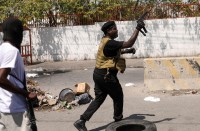RABAT, Morocco (AFP) — A Morocco prosecutor on Sunday presented to an anti-terror judge 15 people suspected of links to the murder of two Scandinavian women in the Atlas Mountains, Rabat’s attorney general said.
The prosecution asked that the suspects be investigated for “setting up a gang to prepare and commit terrorist acts”, “premeditated attacks on life” and “advocating for terrorism”, the attorney general said.
Seven other detainees will be referred to the prosecution in the coming days, the statement added.
Danish student Louisa Vesterager Jespersen, 24, and 28-year-old Norwegian Maren Ueland were found dead at an isolated hiking spot south of Marrakesh on December 17.
The two women were beheaded, authorities have said.
Moroccan authorities have arrested some 20 people over their alleged links to the double homicide, labelled a “terrorist” act by Rabat.
Among those arrested was a Spanish-Swiss man living in Morocco and detained in Marrakech on Saturday over alleged links to some of the suspects.
He subscribed to “extremist ideology”, according to Morocco’s central office for judicial investigations.
The four main suspects were arrested in Marrakesh and belonged to a cell inspired by Islamic State group ideology, Morocco’s counter-terror chief Abdelhak Khiam told AFP.
None of the four had contact with IS members in Syria or Iraq, he said.
The head of the suspected cell is 25-year-old street vendor Abdessamad Ejjoud, according to investigators.
He was identified in a video filmed a week in which the four main suspects pledged allegiance to IS leader Abu Bakr al-Baghdadi, according to authorities.
The killings have shaken Norway, Denmark and Morocco. Another video circulated on social networks allegedly showed the murder of one of the tourists.
Morocco, which relies heavily on tourism income, suffered a jihadist attack in 2011, when a bomb blast at a cafe in Marrakesh’s famed Jamaa El Fna Square killed 17 people, mostly European tourists.
An attack in the North African state’s financial capital Casablanca killed 33 people in 2003.
© Agence France-Presse







